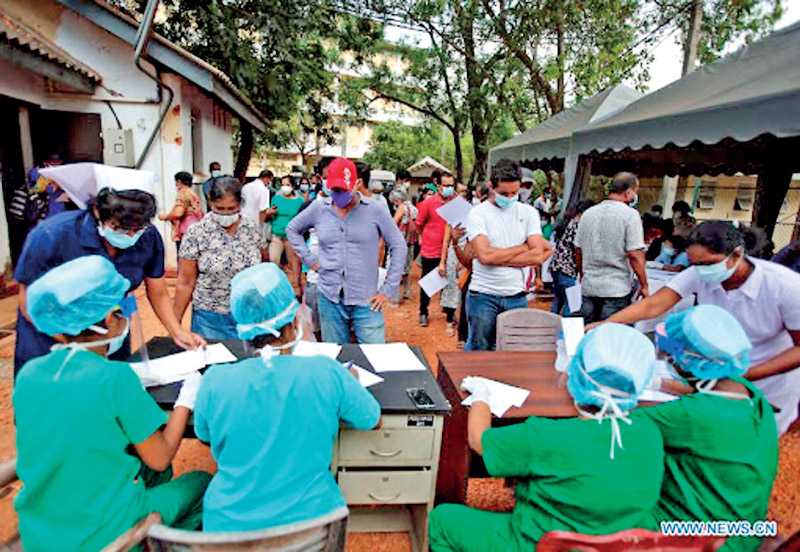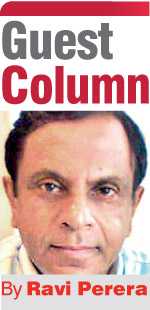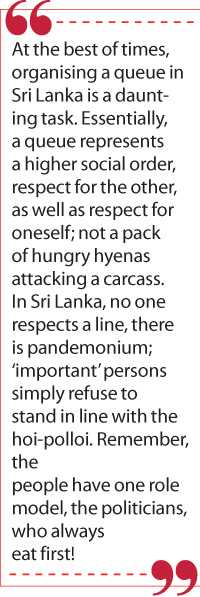Monday Feb 16, 2026
Monday Feb 16, 2026
Thursday, 4 March 2021 00:02 - - {{hitsCtrl.values.hits}}

Although the queue forms around 5 a.m. the vaccination starts at 9 and ends around 3 p.m., strict public service hours. Some days, even before 3, the centre runs out of medicine. One would have thought that the main purpose of such a campaign would be to vaccinate the largest number in the quickest time in order to develop community immunity
 If somewhat unseemly, the communication is reassuring; the Western medical approach is alive and kicking; ‘muthra saha lay pariksava’ (urine and blood testing facilities) abound in the country. In the capital city of Colombo, swept by trade winds for centuries, blatant promotion is unnecessary, all medical centres provide basic investigative facilities, urine testing can be done in suitable privacy, without announcing it to all and sundry.
If somewhat unseemly, the communication is reassuring; the Western medical approach is alive and kicking; ‘muthra saha lay pariksava’ (urine and blood testing facilities) abound in the country. In the capital city of Colombo, swept by trade winds for centuries, blatant promotion is unnecessary, all medical centres provide basic investigative facilities, urine testing can be done in suitable privacy, without announcing it to all and sundry.
Outside of Colombo, things are different. At every junction and every town, centres offering urine/blood testing appear to thrive, stronger the competition, larger the neon board. One cannot be private about medical needs, these are matters to be attended discarding unnecessary modesty, there is no room for privacy or a sense of individuality when your urine needs to be examined!
Intrigued by the proliferation of medical centres publicly offering urine and blood testing services I made some inquiries into the testing modes, which obviously require some knowledge and competence. Like many other so-called service providers in this country, these centres, carrying out their practice in a small dingy space, are really a sham, having neither the equipment nor the trained personnel to do the testing.
After a bumbling and even painful extraction of blood (I take it the urine sample is self-administered), followed by an uncertain labelling of the tube, everything is sent to a large medical centre somewhere in the district, several miles away; selected not for its reliability, but for the lesser charges. The poorly secured sample is perhaps carried by a young motorcyclist, who has several other errands to run. In between, many things could go wrong.
In common with the other nations, the Sri Lankan medical system too was assailed by the COVID-19 pandemic. The virus was new, highly contagious and potentially life threatening. Obviously, the biggest drawback was the obscurity of the virus, so little is known, even now, of its true nature. But the COVID-19 pandemic had to be contained, the whole world scrambled to meet the challenge.
Being an island nation, it was relatively easy to isolate ourselves, in the early days statistically Sri Lanka was among the less affected. With the use of curfews and lockdowns, the spread of the disease can be contained. However, these measures can only be temporary, the economic fallout from closing the country is enormous. Faced with such a situation, a financially weak country has only limited room to manoeuvre. Among our major sources of income are tourism and the remittances from workers in the Middle East, both activities needing free movement. Many employers have downsized their operations, resulting in loss of jobs and an income for thousands of families.
Even when fighting a global pandemic, certain Sri Lankan habits die hard. Ignorance is bliss, the unknown nature of the pandemic allowed us to claim many achievements in the beginning, even global leadership, only to be nullified by evolving events. The numbers of those affected as well as the fatalities increased steadily. Decades of economic mismanagement has drained us of the strength to overcome on our own accord. Again, the international community had to come to our rescue, supplying us with the newly developed vaccination.
These beneficent countries were generous enough to give us the medicine, however they would not organise the administering of the injection. Naturally, when the operation is in local hands, the cultural factors come to the fore. Here, there is no captain waiting for all the passengers to disembark, he bails out first. Understandably, any immunisation program focuses first on the most essential workers, the health, security, transport and then the most vulnerable sectors. Into this definition of priority, we write in the political leaders and their families, the leaders always eat first.
Everything happens in a particular culture. And, every culture will have its language, both informing as well as distorting. Certain languages seem more florid, lending themselves to hyperbole more easily than others. In expression more poetic, effervescent, in these languages it is the telling that matters, not the bare truth. Meanwhile, some languages appear colder, matter of fact, working towards precision, adopting the dry narration, inviting objective assessment, comparing and contrasting realistically. The thinking inherent in these languages is essentially critical, distinguishing, adept at taking the wheat from the chaff. As much as every soldier is no hero, everyone who dabbles in a given activity with some success is not a world champion. Every nurse is not a nightingale, and there is no reason to presume every doctor is a Livingston!
In certain languages, to describe every soldier a hero or every nurse a nightingale will sound foolish, lacking in discernment, while in some languages, it is the praise that matters, the feel-good factor, not the truth thereof.
Regardless of their lack of achievement or even commendable personal qualities, political leaders are feted in Sri Lanka, praised effusively in the public domain. If rationally examined, checked against comparable Asian countries, Sri Lanka’s record is unremarkable, there is no reason for hosannas. Since independence, we appear to have spawned a leadership that in fact has only corrupted the system, doomed our economic prospects, diminished national institutions and brought down overall social standards. Meanwhile, these leaders have not neglected to enjoy every comfort Sri Lanka’s public purse can buy; surely a public so prostrate invites the liberties so taken!
Every project is dedicated to the glory of the leaders, the people have no shame, the leaders have no qualms. Only the other day I saw a stone plaque praising a politician for creating a walkway! A degraded people can only view their leaders through the superlatives provided by the language; the words flow, the praise continues!
Since the pandemic began there is another sector that is being praised in the most exaggerated manner; broadly described as the medical fraternity, the frontline soldiers in the war against the virus. In reference to the pandemic, the fraternity could include the doctors, the PHIs, nurses, attendants, drivers down to the security guards. In the language of high-praise, they are made into a category which probably no other country would boast of; ‘gods walking on earth’, ‘hands that heal’, ‘those willingly sacrificing themselves’, are some of the phrases commonly used.
Although there are several gaps in our knowledge of this respiratory disease, certain features of the coronavirus are discernible. It is highly contagious, although fatalities compared to the affected, is relatively low. We have had Black Death, Ebola, Smallpox, Cholera which have caused much more widespread fatalities in the stricken communities. In the early days, the staff at a hospital refused to attend to work because a patient suspected of corona had been brought there.
By any measure, our doctors are a thriving segment in the country. They are a very fortunate element, an otherwise very expensive medical education was totally free for them, borne by the people of this country. It cannot be that the Hippocratic oath (..to whatsoever houses I enter I will enter to help the sick…) tells them only to rake in the money when the going is good and then run for cover when a pandemic breaks. By doing what they are paid to perform, their oath binds them to do, no one can become a god who walks on earth. The common language must raise the bar to deification, mawkish expressions distort reality. Just as much as politics makes for vainglorious pretenders, five years studying esoteric subjects, unaccustomed social status and the sudden influx of money works towards making pedants it seems. There are no counterbalancing factors in the upbringing.
Our political establishment and the medical fraternity combined, had the ‘onerous’ task of administering the vaccine given by the donors. The donors work was ‘easy’; identifying the virus, finding an antidote, manufacturing the vaccine on a global scale, and, delivering it to our doorstep!
At the best of times, organising a queue in Sri Lanka is a daunting task. Essentially, a queue represents a higher social order, respect for the other, as well as respect for oneself; not a pack of hungry hyenas attacking a carcass. In Sri Lanka, no one respects a line, there is pandemonium; ‘important’ persons simply refuse to stand in line with the hoi-polloi. Remember, the people have one role model, the politicians, who always eat first!
The leaders had got the vaccine administered in the comfort of their homes or at exclusive centres like the army hospital. As for the rest, our medical facilities are surely adequate!
It appears that vaccination centres in the city have descended into chaos. There is apparently no clear authority at the centres, a few nondescript individuals in casual clothes at the gate whispering instructions to those who had reached the top of the line after a three-hour wait. The others while away their time listening to all kinds of gossip, “You need a permit”, “no, you don’t”, “today is only for those who are over 60”, “no, anyone can get it”! Some favoured persons seem to enter the centre through another gate.
Although the queue forms around 5 a.m. the vaccination starts at 9 and ends around 3 p.m., strict public service hours. Some days, even before 3 the centre runs out of medicine. One would have thought that the main purpose of such a campaign would be to vaccinate the largest number in the quickest time in order to develop community immunity. Round the clock vaccination or even two shifts would have brought safety (from the disease) to a larger number.
The queue is very long, slow moving and there is no social distancing whatsoever. Apparently, the Minister in charge visited one of the centres for an inspection. Just before she arrived the police had descended there and in the rudest way ordered those who had spent hours in the queue to maintain distance. Satisfied with the arrangements, the Minister left the centre, the police left with her. Soon chaos reclaimed the sorry scene.
It seems our attitudes have denuded us; our language has disarmed us.